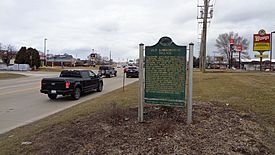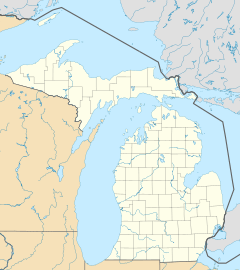Rawsonville, Michigan facts for kids
Quick facts for kids
Rawsonville, Michigan
|
|
|---|---|

Historic marker along Rawsonville Road
|
|
| Country | United States |
| State | Michigan |
| Counties | Washtenaw and Wayne |
| Townships | Van Buren and Ypsilanti |
| Elevation | 709 ft (216 m) |
| Time zone | UTC-5 (Eastern (EST)) |
| • Summer (DST) | UTC-4 (EDT) |
| ZIP code(s) | |
| Area code(s) | 734 |
| GNIS feature ID | 635675 |
| Old Rawsonville Village Informational Designation | |
|---|---|
| Designated | October 27, 1983 |
Rawsonville is a historic place in Michigan, USA. It's known as an unincorporated community, which means it's a place with a shared identity but no official local government. Rawsonville is located right on the border of Washtenaw and Wayne County.
Most of the original Rawsonville village is now covered by Belleville Lake. This lake was created in 1925 when the Eastern Michigan Edison Company built the French Landing Dam and Powerhouse on the Huron River. Rawsonville was officially recognized as a Michigan State Historic Site on October 27, 1983.
Contents
A Look Back in Time
The story of Rawsonville began around 1800. The very first settler to arrive in this area was Henry Snow. He called the place Snow's Landing.
How Rawsonville Got Its Name
In 1825, a man named Amariah Rawson came to the village with his family. He and two other people officially registered the community as "Michigan City" on January 7, 1836. However, some neighbors wanted the name changed. They asked the State Legislature to rename it after Amariah Rawson. On March 22, 1839, the name was officially changed to Rawsonville. A post office, which was originally called Van Buren, moved to Rawsonville on November 14, 1838, and also took the name Rawsonville.
Life in the Village
By the time of the American Civil War, Rawsonville was a busy and successful village. It had several important businesses. There was a grist mill, which ground grain into flour. There was also a saw mill, used for cutting wood. The village even had a factory that made stoves and a workshop where wagons were built.
However, the village's success didn't last forever. When new railroads were built, they didn't pass through Rawsonville. This made it harder for businesses to transport their goods, and the village's industries began to struggle.
The Village Disappears
The Rawsonville post office closed on October 25, 1895. It briefly reopened on November 20, 1895, but then closed for good on February 28, 1902. By 1900, only a few people still lived in the village.
A big change happened in 1925. The Detroit Edison company started building the French Landing hydroelectric dam on the Huron River. This dam created a large artificial lake called Belleville Lake. The entire village of Rawsonville became submerged under the water of this new lake.
Today, the only visible reminder that a village once stood there is a historical marker. You can find it in front of the McDonald's restaurant on Rawsonville Road, across from Grove Road.
 | Roy Wilkins |
 | John Lewis |
 | Linda Carol Brown |



